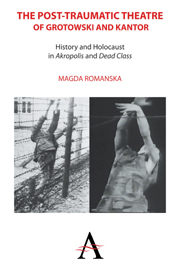 The Post-traumatic Theatre of Grotowski and Kantor
The Post-traumatic Theatre of Grotowski and Kantor Book contents
- Frontmatter
- Contents
- Foreword by Kathleen Cioffi
- Preface
- Acknowledgments
- List of Illustrations
- Introduction
- Part I Our Auschwitz: Grotowski's Akropolis
- Chapter 1 Jerzy Grotowski: A Very Short Introduction
- Chapter 2 Native Son: Grotowski in Poland
- Chapter 3 Grotowski: The Polish Context
- Chapter 4 Grotowski, the Messiah: Coming to America
- Chapter 5 The Making of an Aura
- Chapter 6 On Not Knowing Polish
- Chapter 7 “In Poland: That is to Say, Nowhere”
- Chapter 8 Akropolis/Necropolis
- Chapter 9 The Vision and the Symbol
- Chapter 10 “This Drama as Drama Cannot Be Staged”
- Chapter 11 Two National Sacrums
- Chapter 12 “Hollow Sneering Laughter”: Mourning the Columbuses
- Chapter 13 Against Heroics
- Chapter 14 Representing the Unrepresentable
- Chapter 15 Trip to the Museum
- Chapter 16 Bearing the Unbearable
- Chapter 17 The Living and the Dead
- Chapter 18 Jacob's Burden
- Chapter 19 The Final Descent
- Chapter 20 Textual Transpositions
- Chapter 21 Akropolis After Grotowski
- Part II Our Memory: Kantor's Dead Class
- Postscript
- Appendix
- Notes
- Bibliography
- Index
Chapter 21 - Akropolis After Grotowski
from Part I - Our Auschwitz: Grotowski's Akropolis
- Frontmatter
- Contents
- Foreword by Kathleen Cioffi
- Preface
- Acknowledgments
- List of Illustrations
- Introduction
- Part I Our Auschwitz: Grotowski's Akropolis
- Chapter 1 Jerzy Grotowski: A Very Short Introduction
- Chapter 2 Native Son: Grotowski in Poland
- Chapter 3 Grotowski: The Polish Context
- Chapter 4 Grotowski, the Messiah: Coming to America
- Chapter 5 The Making of an Aura
- Chapter 6 On Not Knowing Polish
- Chapter 7 “In Poland: That is to Say, Nowhere”
- Chapter 8 Akropolis/Necropolis
- Chapter 9 The Vision and the Symbol
- Chapter 10 “This Drama as Drama Cannot Be Staged”
- Chapter 11 Two National Sacrums
- Chapter 12 “Hollow Sneering Laughter”: Mourning the Columbuses
- Chapter 13 Against Heroics
- Chapter 14 Representing the Unrepresentable
- Chapter 15 Trip to the Museum
- Chapter 16 Bearing the Unbearable
- Chapter 17 The Living and the Dead
- Chapter 18 Jacob's Burden
- Chapter 19 The Final Descent
- Chapter 20 Textual Transpositions
- Chapter 21 Akropolis After Grotowski
- Part II Our Memory: Kantor's Dead Class
- Postscript
- Appendix
- Notes
- Bibliography
- Index
Summary
Since Grotowski's death, there have been a number of attempts in Poland to stage Akropolis, either Wyspiański's or Grotowski's version. In April 2001 Akropolis was revived at Teatr Narodowy under the direction of Ryszard Peryt (set design by Ewa Starowieyska), who is better known as an opera director than a theatre director. Peryt's production was not successful. It stressed the national and religious character of the play while adding one more character from another Wyspiański play, Wyzwolenie [Liberation]. Konrad, a hapless, Polish Romantic hero who turns into Hector, Jacob and King David, contains in himself all of the major characters, thus unifying the plot structure of the play. Wyspiański took Konrad originally from Mickiewicz's Forefathers’ Eve, a Polish Romantic drama with undertones of the Hamletian dilemma of action versus inaction. Roman Pawłowski, writing in Gazeta Wyborcza, mocked Peryt's choice as an unfortunate attempt to reframe the national liberatory theology in a new European context (“Poland, the Christ of the nations, becomes Poland the Europe of the nations”), thus replicating the closed-minded pathos of the national–religious eschatology – something that, Pawłowski notes, both Wyspiański and Grotowski luckily escaped. “The difference between Wyspiański's work and Peryt's,” Pawłowski wrote, “is like the difference between the Bible and its radio talk-show interpretation.” He added:
Peryt does not look for contradictions in Wyspiański's work; he is not interested in the dialectic of apotheosis and mockery on which Grotowski [built] his spectacle. The drama which was an attempt to sum up the European civilization in one tradition of antiquity, Judaism and Christianity, in Peryt’s version becomes reduced to Polish Catholicism, a mistaken belief that all highest European values come from Poles.
- Type
- Chapter
- Information
- The Post-traumatic Theatre of Grotowski and KantorHistory and Holocaust in 'Akropolis' and 'Dead Class', pp. 152 - 182Publisher: Anthem PressPrint publication year: 2012
